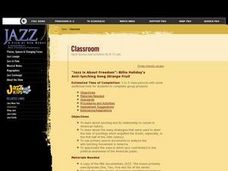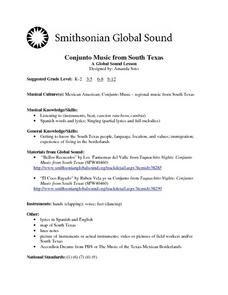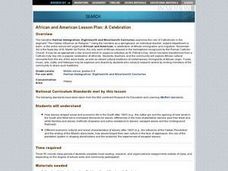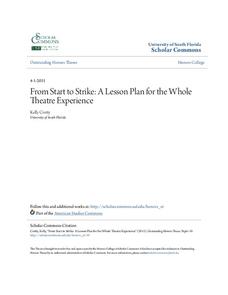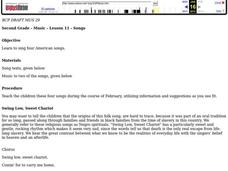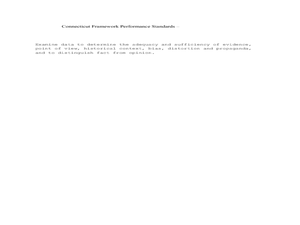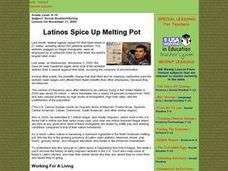Curated OER
"Jazz is About Freedom": Billie Holiday's Anti-lynching Song Strange Fruit
Working in small teams, learners analyze a variety of primary source materials related to lynching (news articles, letters written to or written by prominent Americans, pamphlets, broadsides, etc.) in order to assess the effectiveness of...
Curated OER
Conjunto Music from South Texas
Young scholars listen to conjunto music and identify the instrumentation. After discussing the the history of South Texas, they examine lyrics of several songs and interpret them. As extensions, students can learn to partner dance to...
Curated OER
Remember the Bridge: Poems of a People
Fifth graders explore poems of African Americans. They research a famous African American, write a report, create a timeline of events in African American history, create a map of the New World, and research Molly Walsh. After...
Curated OER
Little Train of Caipira
Pupils listen to the "Berry Pickers' Song" on the piano twice. They practice the song several times to become familiar enough to recognize it in the piece. They listen to the CD and recognize the tune by raising their hand and tell what...
Curated OER
History: An African American Cultural Celebration
Students prepare and organize a cultural celebration of African migration and immigration. Working in groups or individually, they research topics and present the information, including dance demonstrations, instrumental or vocal...
Curated OER
"Open Mic" - Giving Creative Expression To The Connection Between The Japanese American Internment, September 11, And Our Rights Today
Young scholars explore the similarities of the Japanese-American experience in WWII and Arab-American experience in post-September 11 US policy. They create presentations on their reflections and express themselves through poetry, dance,...
Curated OER
Lambert, Hendricks, and Ross, Moanin,' Payin' Your Dues
Young scholars examine the musical styles of call and response and the blues while delving into the difficult lives of many jazz musicians. Travelling in the South was challenging for black musicians during this time and the difficulties...
Curated OER
Revolutionary Money
Examine paper money from the American revolution! Historians study the paper bills and discuss the history of money. How has money changed over the times? Activities are included.
Curated OER
Puerto Rico: The 51st State?
Learners research the history of Puerto Rico, its culture, and geography. In this Puerto Rico lesson, students find Puerto Rico on a map and find specific regions or cities. Learners discuss Puerto Rico's statehood and listen to salsa...
Curated OER
Catch the Gullah Beat: Rhythm and Percussion
Students explore the Gullah culture. In this social studies instructional activity, students construct and play instruments similar to those of the Gullah people.
Honors College at Scholar Commons
From Start to Strike: A Lesson Plan for the Whole Theatre Experience
Introduce young thespians to all aspects of the theater. A syllabus for a one-semester drama course provides lessons that take learners from the history of drama to the many facets of play production.
Curated OER
Songs
Second graders study four American songs that they will sing during the month of February. They discuss the origins and meanings of the songs.
Curated OER
Breaking the Code: Actions and Songs of Protest
Students listen to and discuss the purpose of protest music. They analyze an editorial cartoon related to Jim Crow and read questions from the literacy tests given to African-Americans. They work together to write a song about the...
Curated OER
The Gullah People of the Sea Islands
Eighth graders examine the lives of the Gullah-Geechee people. In this unique cultures lesson plan, 8th graders explore music, language, and slavery of the Gullah-Geechee people from the southern low-country in the United States....
Curated OER
The Life and Work of Jacob Lawrence
Black History Month provides a time to talk about the accomplishments of African Americans like Jacob Lawrence.
Curated OER
Romare Bearden
Students identify artwork by Romare Bearden and to explain his techniques. They look for cut and pasted papers and images, paint, ink and pencil designs, shapes and spaces and the rhythms therein. They listen to music by looking at...
Curated OER
Jazz in America
Students learn where Jazz came from and why it is an important part of America's history.
Curated OER
Political and Social Origins of the Civil War
Middle schoolers examine the difference in politics in the North and South during the Civil War. Using that information, they discuss how politics and ideologies led to the war. They explain the causes and effects of the war and evaluate...
Curated OER
Regional Songs in the Southern American Experience
Students write a song about transportation in 100 years after comparing and discussing "Proud Mary" and "The Midnight Special".
Curated OER
Corridos About the Mexican Revolution
High schoolers explore the meaning behind Mexican corridos. In this Mexican Revolution lesson, students discover details about the war and its leaders as they read, analyze, and write their own corridos.
Curated OER
Introductory Lesson on Prejudice
Students define prejudice. In this cultural diversity lesson, students analyze the lyrics of "Carefully Taught," from Broadway's South Pacific and then discuss and debate the attributes of prejudice.
Curated OER
Latinos Spice Up Melting Pot
Students investigate the history of early Hispanic workers in the U.S. They complete an online Webquest, explore various websites, read about Latinos in the U.S. today, view a mural, and answer discussion questions.
Curated OER
The Cherokee: The Principal People (Ani-Yunwiya), 1700 - 1838
Students read passages and research the Cherokee Tribe and write an account of a typical day as a Cherokee Native American. In this Cherokee lesson plan, students listen to Cherokee music, read Cherokee passages, fill out worksheets, and...
Curated OER
Exploring Cultural Rituals
Students analyze images and music of common rituals in America with those of other countries. They use worksheets to compare and contrast the events.


